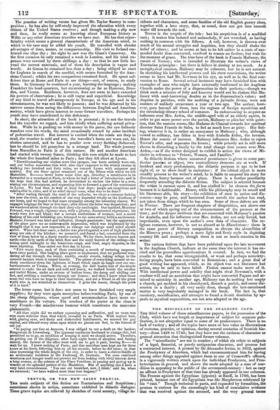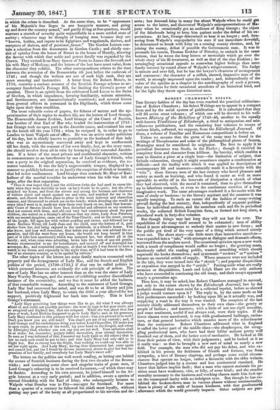THE MISCELLANY OF THE SPALDING CLUB.
THE third volume of those miscellaneous papers, in the possession of the Club, which have not length or importance of subject for separate pub- lication, is not altogether equal to some of its predecessors. There is no lack of variety ; and all the topics have more or less value as illustrations of customs, practice, or opinions, during several centuries of Scottish his- tory—from 1428 to 1740; but they have not the raciness of character or general attraction that distinguished former volumes.
The "miscellanies" are ten in number ; of which six relate to subjects of a legal, financial, or purely antiquarian character, and possess but a contracted interest. A protest by Sir Alexander Irvine, in 1652, against the Presbytery of Aberdeen, which bad excommunicated him for having among other things appealed against them to one of Cromwell's officers, is a vigorously written attack upon the individual Presbyters, and Pres- byterianism in general, and shows the mode adopted by a man of con- dition in appealing to the public of the seventeenth century : but as racy an affront to Presbyters of that time has already appeared in our columns. The Process against the Egyptians (gipsies) at Banff, in 1700, has been printed, because one of the Egyptians was the Macpherson celebrated by his "rant." Though technical in parts, and expanded by formalities, the process is curious for the exceedingly lax kind of cumulative evidence that was received against the accused, and the very general terms in which the crime is described. At the same time, to be " oppressors of his Majestie's free lieges in ane bangstrie manner, and going up and down the country armed," and partly living at free quarters, would warrant a stretch of severity quite nnjustifiable in a more settled state of society ; whatever may be thought of hanging men because they are "known, holden, and repute to be Egiptians and wagabonds, theives, and receptors of theives, and of pessimeejizirue.” The Gordon Letters con- tain a selection from the documents at Gordon Castle ; and chiefly con- sist of epistles from the house of Stuart to the house of Handy, showing the favour with which that noble and potent family was regarded by the Crown. They extend from Mary Queen of Scots to James the Seventh and his wife Mary of Modena; and the letters of the last have most value, from the character they exhibit. The other correspondence relates to the time between the accession of the Brunswicks till just before the outbreak of 1745 ; and though the writers are not of such high rank, they are more amusing and instructive. A letter from Sir Robert Munro, in 1718, contains a curious account of the Scottish Peerage scheme to ac- company Sunderland's Peerage Bill, for limiting the Crown's power of creation. There is an epistle from the celebrated Lord Lovat to the Duke of Gordon, in which impudence, fawning familiarity, minute attention, and facetiousness, are characteristically combined ; and several letters from general officers in command in the Highlands, which throw some light upon their then condition.
The most valuable series of papers, for fulness of matter and the ap- proximation of their topics to modern life, are the letters of Lord Grange. The Honourable James Erskine, Lord Grange of the Court of Session, was brother of that Earl of Mar who headed the insurrection of 1715 : but Grange took no open part in the Jacobite cause, and retained his seat on the bench till the year 1734 ; • when he resigned it, in order to go to London to hunt Walpole out of office. He was an active under politician of his day, but is chiefly known to posterity as the husband of that lady who was so mysteriously conveyed away and kept in confinement till her death, with the consent of her own family, lest, as the story runs, she should involve them all in ruin by betraying their concealed Jacobit- ism. If a letter of the most private and confidential character, written in remonstrance to an interference by one of Lady Grange's friends, who was a party to the original separation, be received as evidence, the ro- mance vanishes. It was the lady's ungovernable temper, displayed in a manner so publicly indecent as to justify the suspicion of drink or insanity, that led to her confinement. Lord Grange thus reminds Mr. Hope of Ran- keilour of the marital troubles he underwent when his wife was left at large, after the first separation.
"Then it was hoped that I and the childeren (who she had used to curse bit- terly when they went dutifully to wait on her) would be in quiet; but she often attacked my house, and from the streets and among the footmen and chairmen of visiters cryed and raged against me and mine, and watched for me in the streets, and chaced me from place to place in the most indecent and shameless manner, and threatened to attack me on the bench; which dreading she would do every time I went to it, made my duty there very heavy on me, least that honour- able Court of Session should have been disturbed and affronted on my occasion. And not content with these, and odd and very bad contrivances about the poor children, she waited on a Sunday's afternoon that my sister, Lady Jean Paterson, with my second daughter, came out of the Tron Church; and on the street, among all the people, fell upon her with violent scolding and curses, and followed her so down Marlines Wyud, till Lady Jean and the child, near the bottom of it gott shelter from her, and being exposed to the multitude, in a friend's house. You also know, and may well remember, that before you and the rest advised the se- paration, and till she went from my house, she would not keep herself in that part of it (the best apartment) which was assigned her, but abused all in the family; and, when none were adverting, broke into the room of ane old gentle- woman recommended to me for housekeeper, and carryed off and destroyed her accompts, &c., and committed outrages, so that at length I was forced to have a watch in my house, and especially in the night time as if it had been in the fron- tier of an enemyes country, or to be spoiled by robbers."
The other topics of the letters are some family matters connected with property and the derangement of Lady Mar, and the Scotch and English politics of the period, (1730-1733,) if that can be called politics in which personal interests are evidently the sole principle of action. The case of Lady Mar has no other interest than as she was the sister of Lady Mary Wortley Montagu, and the means of exhibiting another discreditable instance of the eccentricity, and we fear it must be added the badness, of that remarkable woman. According to the statement of Lord Grange, Lady Mar had recovered her mind, and was fit to be at liberty and join her husband, when Lady Mary, to retain the 5001. a year allowed for her support, positively frightened her back into insanity. This is Lord Grange's statement.
" Lady Mary perceiving how things were like to go, did what I was allways afraid of, and could not possibly prevent: she went in rage to her poor sister, and so swagered and frighted her, that she relapsed. While she was about that tine piece of work, Lord Erskine happened to go to Lady Mar's; and, in his presence, Lady Mary continued to this purpose with her sister: Can you pretend to be well ? Dont you know you are still mad? You shan't get out of my custody; and, if Lord Grange and his confederates bring you before Lord Chancellor, I'll make you in open court, in presence of the world, lay your hand on the Gospell, and swear by Allmighty God, whether you can say you are yet well. Your salvation shall be at stake: for, remember, perjury infers damnation, your eternal damnation. So soon as I was informed of this, I assured my Lady (and so did others) that in law no such oath could be put to her; and that Lady Mary had only said so to fright her. But so strong was the fright, that nothing we could say was able to set her right again. And Lady Mary, having thus dismounted her, came again and coaxed her, and(as I found by diverse instances) strove to give her bad im- pressions of her familly, and everybody but Lady Mary's sweet self."
The letters on the politics are well worth reading' as letting one behind the scenes of Scottish business during the first two decades of the Bruns- wicks ; and containing some close and singular traits of great men, if Lord Grange's colouring is to be received fornatnre,—of which there may be doubts. According to his own account, he joined himself to the Ar- gyle interest at a very early period ; and in addition, swore a species of eternal friendship with the Earl of Islay, who subsequently became to Walpole what Dundas was to Pitt—manager for Scotland. For more than a quarter of a century he followed his chiefs most loyally, without getting any part of the booty at all proportioned to his -services and de- serts ; but detected Islay in many lies about Walpole when he could get access to the latter, and discovered Walpole's misrepresentations of Ma- jesty when he occasionally got an audience of King George ; the object of the falsehoods being to keep him patient under the defeat of his ex- pectations. At last, Grange determined to bear it no longer ; and, fore- seeing from Walpole's unpopularity his sure if not immediate downfall, he determined to break with Islay on a coming county election, and, by joining the enemy, defeat if possible the Government man. It was to persuade his cousin, Thomas Erskine of Pittodry, to embark in the same bottom, that he wrote the long letters or memorials which go over the whole story of his ill-treatment, as well as that of the clan Erskine ; in- termingling occasional appeals to somewhat higher feelings than mere family interest by round abuse of Walpole's misgovernment. The Judge is minute and over full, but he has the lawyer's clearness of arrangement and statement : the character of a selfish, shrewd, impassive man of the world, is strongly impressed upon the reader; and, independently of the value of the epistles as a chapter in the autobiography of such a person, they are curious for their occasional anecdotes of an historical kind, and for the light they throw upon historical men.



































 Previous page
Previous page